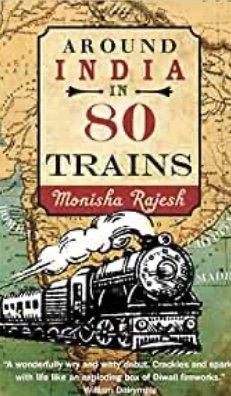Around India in 80 Trains by Monisha Rajesh (Nicholas Brealey Publishers, Hachette UK)
“London had never looked so grey,” as it did on the day Monisha Rajesh decides to travel through India by train--on 80 of them, in honor of Jules Verne’s Around the World in 80 Days. More than 20 million passengers travel that way in India every day, along routes that stretch for 64,000 kilometres, so she figures her dream is possible.
Rajesh’s parents both came to England from India as doctors. “Two children and fifteen years later,” her family tried to resettle in Madras but when her father discovered that the hospital he worked in did a flourishing business in selling the hearts of dead patients, he decided this wasn’t a place where he wanted his children to grow up. That two-year stint was all Rajesh had experienced of India. Now she prudently decides that if she’s going to explore the country the way she plans, she needs a traveling companion and settles on a young Norwegian photographer who (for reasons of discretion) she refers to as Passepartout (the name Verne gave Phileas Fogg’s comrade in the 80-day journey).
Although they miss their first train in Chennai, Rajesh has an uncle who assures her “Leave it to me, my dear,” and finds them seats on what she calls The Insomnia Express. This is only the first of many sleepless nights enhanced by snores from neighboring bunks and itchy blankets that come in a paper bag wrapping. Passepartout quickly discovers the black coffee that he requires every morning is hard to come by in the land of chai and makes the mistake of cooling a prized cup of his favorite brew with a dribble of tap water. Rajesh learns that her basic Hindi leaves her prey to questions of whether she and her comrade are married and why her father allows her to travel as she does. “To be honest, “ she says, “the only place where I feel like a foreigner is in India,” where she’s immediately pegged as an NRI, non-resident Indian.
Part of that foreign identity is probably because she’s traveling with Passepartout. When a bitter skirmish over Indian temples and belief causes them to go in separate directions, Rajesh becomes accepted by her fellow passengers and the solitary journey she feared is essentially nonexistent. “On the rare occasions you find yourself alone in India, it is never for long.” In a compartment with three strange men for 28 hours, by the time the first meal appears, it’s “like eating with family.” “You haven’t eaten very much,” the men chide her in tones reminiscent of her mother, “By Indian standards, you are very underweight.”
By the end of her four-month journey of 40,000 kilometers on 80 trains, (all listed at the beginning of her book), she disembarks at her starting point, back in Chennai, and happily allows the crowd “to sweep me into its embrace.”
Rajesh’s crisply written descriptions range from the unsparing to the lyrical. From the “worst hotel in India,” which gives a new dimension to squalor, to the grand luxury of the Indian Maharajah-Deccan Odyssey, “a five-star cruise on wheels” that whisks passengers through India at night like “a luxury Tardis,” her experiences are recounted in a lively and humorous fashion that never falters. Whether she wakes to find a hand groping her, which she circumvents by swiftly changing bunks with Passepartout, gleefully imagining that hand fondling “a tired and grumpy Norwegian” or hears the familiar voices of her best friend’s Cambridge parents soon after she begins her first solitary train trip in tears, Rajesh takes it all in stride.
Her conversations with strangers are illuminating and delightful, even when a man tells her without rancor that she’s a very selfish person, adding “Why are you caring if I am telling such a thing,” and then presents her with a translation of the Bhagavad-Gita. Another one scolds her, “You have traveled on 64 trains and you still don’t know how to make a bed.” After doing that for her in the proper fashion, he gives her a tutorial on the meaning of the numbers painted on each car that gives the age of the carriage. “It was like learning a secret handshake.”
India comes alive under her skillful writing--rain that’s “the kind that lacerates human skin” and mixes “mud and stone into a paste of Rocky Road ice cream,” “halos of light from candles in doorways,” a train that looks like a “metallic version of The Very Hungry Caterpillar, “mynahs muttering quietly to themselves as the sky took on an eerie orange glow” at dusk.
Rajesh is the perfect traveling companion. Even if it’s impossible to accompany her while eating chicken lollipops, drinking Thums Up, and discussing the palanquin carriers’ strike, buying an IndRail pass and carrying her book as a guide seem to be the only sane response to this absorbing work of travel literature. Reaching its end prompts the sentiment voiced by a New Delhi ticket agent, “Oh God…where are you going now?” To discover the answer, a quest for Rajesh’s Around the World in 80 Trains is the next step--I can’t wait to find it and go off with her on another journey.~Janet Brown
